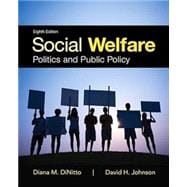Note: This is the loose-leaf version of Social Welfare and does not include access to the Enhanced Pearson eText. To order the Enhanced Pearson eText packaged with the loose-leaf version, use ISBN 0134150511.
Acknowledged as the most comprehensive, easy-to-read introduction to social welfare policy available, Social Welfare: Politics and Public Policy, 8/e, emphasizes the current political aspects of policymaking and major social welfare programs, including public assistance, Social Security, disability, health insurance, child welfare, and much more. Social Welfare does more than describe the major social welfare policies and programs; it also tackles the conflict and controversies involved in the processes and outcomes of policymaking. It contrasts rational and political approaches to policymaking, policy analysis, policy implementation, and policy evaluation. The authors present conflicting perspectives, encouraging students to think critically, to debate, and to consider their own views on issues. The Enhanced Pearson eText features video links and embedded assessments.
Improve mastery and retention with the Enhanced Pearson eText*
The Enhanced Pearson eText provides a rich, interactive learning environment designed to improve student mastery of content. The Enhanced Pearson eText is:
- Engaging. The new interactive, multimedia learning features were developed by the authors and other subject-matter experts to deepen and enrich the learning experience.
- Convenient. Enjoy instant online access from your computer or download the Pearson eText App to read on or offline on your iPad® and Android® tablet.*
- Affordable. Experience the advantages of the Enhanced Pearson eText along with all the benefits of print for 40% to 50% less than a print bound book.
* The Enhanced eText features are only available in the Pearson eText format. They are not available in third-party eTexts or downloads.
*The Pearson eText App is available on Google Play and in the App Store. It requires Android OS 3.1-4, a 7” or 10” tablet, or iPad iOS 5.0 or later.











